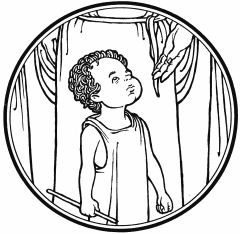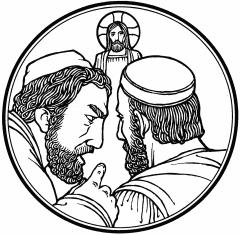Grace, mercy, and peace to you from God our Father, and from our Lord and Savior, Jesus Christ, amen. The text for the sermon is the Gospel, which was read earlier.
Once again, we see Jesus on His way to Jerusalem. There, He was about to shed His lifeblood as the sacrifice for our sins and for the sins of the world. Prophesied by the inspired prophets of God for years and years, the fulfillment must have been on our Lord’s mind.
His reputation had been well-established by this time. His miracles attested to His power, His teaching to His gracious wisdom. People flocked to see Him wherever He went. His popularity had also increased among the people of Israel and so had the opposition and hatred of the religious establishment, the scribes and the Pharisees. The Pharisees followed Him and tried again and again to challenge Him and His work. In our text, Jesus taught them and answered their questions – He tells that God brings couples together; He guides their lives together that they might live their lives for God. And with the disciples He urged the sanctity of marriage. Then He teaches us that God not only loves husbands and wives, but that He loves the products of these marriages, their children. They are indeed beloved by God, and they are important to our Lord, for Scripture is clear that Jesus came for all.
All of this was prompted by people bring little children to Jesus in order for Him to touch them, to receive a blessing from Him. This was not necessarily a bad thing. This was actually a good thing, because it showed the love of the Savior that they had. They recognized that Jesus had come not only for them but also for their little children. They went to have their children receive the blessing and love of the Savior.
This is one of the most delightful and comforting, and at the same time saddest stories in the synoptic Gospels. By preventing people from bringing their children to Jesus, the disciples revealed that they considered children too immature to profit from the Lord’s attention and were not yet in need of a Savior. If anything, they were a bother to Him. But Jesus took the side of the people who brought their children, not that of the disciples.
In Mark’s Gospel, only one other time does he record that Jesus became indignant or angry. That time, it was directed against the Pharisees. This time, it is directed against His own disciples. It is hard to believe that Jesus was angry at His disciples, but here He was, angry at them for what they had done. Jesus had righteous anger and proceeded to show the disciples how wrong they were in their actions.
The reason why Jesus was so angry towards His disciples was because they were turning away those whom Jesus had come for. Jesus came for all people. His life, death, and resurrection would earn salvation for all peoples, whether they were young or old. Jesus indeed came to seek and to the save the lost, and here in this instance, it included the little ones. He showed that even the little children were precious in the eyes of His heavenly Father and they were precious in His eyes as well.
For the disciples, they saw the children being brought to Jesus as a bother because they were just that, children. Jesus was intended for the adults, for it is only the adults who could believe and have faith, or so the disciples thought.
What a sad thing for the disciples to believe. With that mindset, all children are outside of the grace of God. All children are excluded from the blessings of forgiveness, life, and salvation. In short, children are excluded from the forgiveness that Jesus Christ has won for them and for all people.
Unfortunately, that same school of thought continues even today. Baptism is excluded for children, especially for infants, because they are either born sinless or they are incapable of making that decision for Jesus and choosing to be baptized on their own. But here’s the truth that they don’t want to admit: children are born sinful. We are all born sinful and remain sinful until our Lord calls us to Himself. That is our original sin at work, that sin which we are born with. But the other thing to acknowledge is that children, if left to their own devices, would not choose to come to Jesus. If that isn’t shocking enough, I’ll let you in on a secret: if left to your own devices, you wouldn’t come to Jesus either. None of us ever would because we are born enemies of God and want nothing to do with Him. Martin Luther wrote, “I believe that I cannot by my own reason or strength believe in Jesus Christ, my Lord, or come to Him….” It’s not us who comes to Jesus but it is Jesus who comes to us.
Ultimately, the disciples failed to understand why Jesus came and what His kingdom was all about. So Jesus proceeded to teach His disciples and us adults two important lessons.
First, God’s kingdom is also for children. Faith is not a matter of the intellect or will, but a matter of trust in Jesus and in the promises of our gracious Father. That trust in Jesus and God’s promises is granted to us by the Holy Spirit, who works saving faith in us, granted to us in our Baptism. That is why we practice infant Baptism, because children are born sinners and need the forgiveness of sins just as much as you and I do as adults. The Holy Spirit can work saving faith in the heart of an infant or child, just as it does for adults. We heed the words of Jesus, “Let the children come to me; do not hinder for them, for to such belongs the kingdom of God.”
The second point that our Lord teaches His disciples is not only are children part of God’s kingdom through faith in Him, but also, it is precisely that kind of faith that God looks for in all of His believers: simple, humble, trusting faith that looks only to Him. By nature, just like little children, we’re unable to save ourselves. We truly are dependent on God; we can’t make a decision to follow Christ, but the Holy Spirit comes and creates this faith in us. This faith is a gift of God and it is by this faith that we receive the kingdom of God, Jesus says, “Truly, I say to you, whoever does not receive the kingdom of God like a child shall not enter it.”
Despite what others teach, the truth remains that there is original sin. Children receive the guilt of their parents by nature and need salvation. Children inherit that sin from our first parents, Adam and Eve. They need forgiveness and that is why Jesus bids them to come to Him. Through Baptism, He gives His gracious forgiveness of sins to everyone, from the youngest of the young to the oldest of the old.
In the gift of Baptism, God graciously welcomes all into His saving faith, bestowing upon them the Holy Spirit. He grants them forgiveness through this gracious gift of water and the Word. He bids us all to come to Him, to trust in Him as a child, with a faith that takes His Word to heart, completely trusting in Him and His love. In Jesus name, amen. Now the peace of God that passes all understanding, keep your hearts and minds through faith in Christ Jesus, amen.

